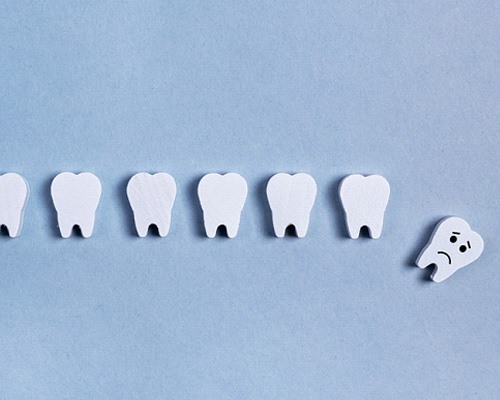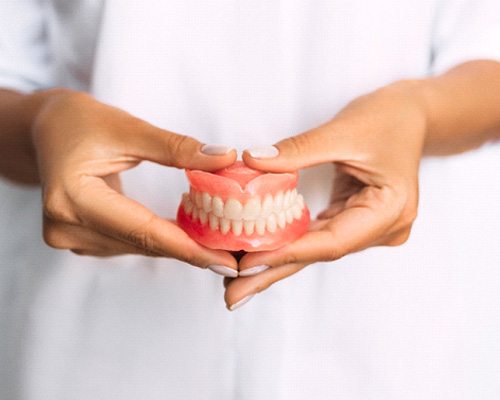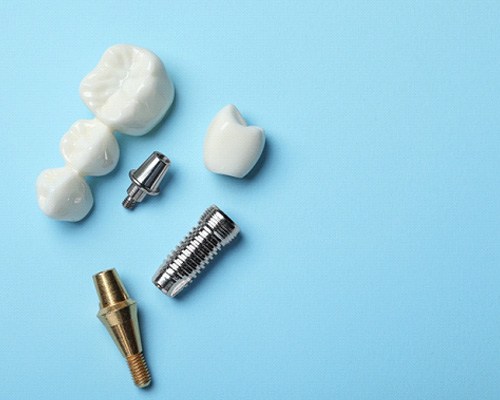Dentures – Jenks
Show off a Complete Smile
You rely on having teeth every day to complete daily tasks. Something as simple as chewing your food or speaking clearly can be made significantly more challenging when you have gaps in your smile. That’s why at Elwood Avenue Dental, we are proud to offer partial dentures, full dentures, and implant dentures to help our patients show off a complete smile. To learn more about dentures or to schedule a consultation, don’t hesitate to contact us.
Why Choose Elwood Avenue Dental for Dentures?
- Customized for a Natural Appearance
- We Welcome Dental Insurance
- Flexible Financing Available
Who’s a Good Candidate for Dentures?

Whether you’ve lost one or several teeth, gaps in your grin can detract from your daily quality of life. Anyone in these circumstances can potentially benefit from dentures. These prosthetics are a versatile solution that can be adapted to meet your unique dental needs. However, before proceeding, you’ll receive professional guidance from one of our dentists during your initial consultation to determine whether this is the best treatment for you. Continue reading to learn more about what makes you a good candidate for dentures, and feel free to contact us to schedule an appointment or request additional information.
Effects of Missing Teeth

Did you know that an estimated 69% of American adults have lost at least one tooth by the time they’re 44 years old? There are several potential causes, but the number one concern is gum disease. Periodontal problems weaken the tissues that hold teeth in place, causing them to become destabilized and fall out. Tooth decay and physical injury can also cause severe enough damage that they’re lost or dislodged.
Whatever the reason for your tooth loss, it’s bound to impact your oral health. Your body starts to reabsorb bone mass from your jaw that’s no longer needed to support them, so it slowly deteriorates. This can lead to changes in your facial structure, like sagging cheeks, in addition to functional issues like difficulty speaking and eating.
In addition to that, people missing teeth often feel overly self-conscious about the changes to their appearance and become anxious, depressed, or less willing to engage socially.
What Qualifies You for Dentures?

Potentially, any individual who has lost several or all their teeth can be a candidate for dentures. This might be the right treatment for you if:
- You’ve experienced significant tooth loss.
- You have sensitive teeth, especially when consuming anything overly hot or cold.
- Your jawbone has sufficient density to support your prosthetics.
- You’re committed to oral hygiene and capable of cleaning them daily.
- You’re seeking a cost-effective replacement option.
After your consultation, our team can recommend the type of restoration that would work best for your circumstances. Whether you need full, partial, or implant dentures, our team will help you recreate your smile.
Alternative Tooth-Replacement Options

If we determine that this method isn’t the best fit for you, then we might suggest one of the alternative options, like dental bridges or implants. Below is a more detailed description of each of these choices:
- Dental bridges: These are best for those who are missing one or several teeth in a row. They typically consist of the correct number of artificial teeth with a dental crown on either side. These are used as anchors over healthy teeth on either side of the gap in your grin.
- Dental implants: This involves surgically placing titanium posts into your jawbone to support your final restoration, such as a dental crown, implant bridge, or implant dentures. It is often more costly than traditional dentures but is a more permanent, long-term solution.
Types of Dentures

There are multiple different types of dentures available to cater to a variety of different tooth-replacement needs. During your consultation, we will discuss your options to choose the right tooth replacement option for you. Here are the dentures that we offer.
Partial Dentures
Partial dentures work great for people who still have some healthy teeth in an arch. A partial denture fits in between the surrounding teeth, almost like a puzzle piece, and is held into place using clasps. This way, missing teeth in several different locations in the mouth can be replaced by a single prosthetic for each arch.
Full Dentures
A full denture replaces an entire arch of missing teeth. Instead of being held into place using clasps, full dentures remain stationary thanks to the shape and natural suction of the mouth. This type of denture is made with a gum-colored base and holds natural-looking replacement teeth into place.
Implant Dentures
If you are looking for a sturdier, longer-lasting tooth replacement option, dental implant dentures are an excellent solution. These dentures are held into place with titanium, screw-like implants that are surgically placed in the jawbone to act as tooth roots. They allow for additional bite force and prevent bone loss from occurring over time.
How Dentures Are Made

The process of creating your new dentures is a fascinating one, and learning more about how they’re made can make it easier for you to understand why properly caring for them is so important. The denture creation process takes between about six few weeks to three months to complete. This includes your initial visit to Elwood Avenue Dental for impressions to any fittings and returns for adjustments.
What Are Dentures Made Of?

The gum base of your new dentures is made of a durable acrylic that is both natural-looking and comfortable, and the crowns are made of either acrylic or porcelain. Using acrylic allows the base to remain somewhat flexible, both for comfort and functionality reasons. It is important to keep your dentures always hydrated to keep the acrylic soft and prevent it from warping or cracking. This is why it is recommended that you remove your dentures and soak them overnight each night when you go to bed.
The Denture Creation Process

Your new dentures have quite a journey before they make it to your mouth. There are many steps involved in their creation, the start of which begins right here at Elwood Avenue Dental. First, your dentist will make a model using impressions of your mouth and jaw made of wax or plastic. You will then try on the model several times to ensure that the fit, shape, and color are correct.
Next, the model will be sent to a lab where it will be placed in an articulator for the teeth to be attached with wax. A technician will carve the wax, so it looks like your gums. This will then be used for your completed dentures.
Your dentures will then be set in a flask and covered in plaster to maintain their shape. The wax is then melted off, and the technician will then apply a liquid separator onto the plaster before injecting acrylic into the flask. Once the acrylic has hardened, the plaster is removed, and the dentures are sent to an ultrasonic bath. They are then trimmed of any excess acrylic and polished with pumice before heading back to your dentist’s office for your first fitting.
Adjusting to Your New Dentures

Adjusting to your new dentures may take a few weeks. Your mouth needs to get used to the feeling of having them in place and may also need to heal from any tooth extractions performed before you got them.
At first you may feel some discomfort as your gums get acclimated to wearing them, but this will subside shortly. It is very important that you remove them each night to soak them and to give your mouth a break from wearing them. This is essential to prevent bone deterioration. Though your dentures will help stimulate your jawbones and prevent bone loss if used properly, wearing them too long can have the opposite effect.
The Benefits of Dentures

It can be hard to engage in daily tasks such as eating, smiling, and speaking if you are missing multiple teeth. Thankfully, dentures can change a patient’s life by replacing lost teeth with lifelike restorations. These appliances can be used to replace one, several, most of, or all of a patient’s grin, making it easier to smile, chew, and speak normally and confidently again. Here’s a brief overview of some of the benefits dentures offer, but please reach out to our office in Jenks if you have any questions.
Psychological Benefits

It can be difficult to accept tooth loss, which can lead to diminished self-esteem, a reduced desire to engage in social activities, and an increased risk of sadness or depression. Restoring your smile with dentures can improve your confidence and self-esteem, making it easier to smile and socialize. Dentures can also minimize the anxiety many patients feel about speaking and chewing during social engagements.
Clearer Enunciation

Tooth loss can make it more difficult to form certain sounds during speech. The lips and tongue need to be positioned precisely to pronounce words properly, and the teeth play a crucial role in directing the flow of air. Since dentures act as your missing teeth, wearing them can make it much easier to enunciate your words clearly. While you can expect a brief adjustment period while you learn to talk with your dentures, speaking will come more easily as you get more practice.
Improves Nutrition

Losing teeth can make it much more difficult to eat a nutritious diet. Many healthy foods like veggies, fruits, and meats can be tough or fibrous, making it difficult if not impossible to chew them properly with missing teeth. This can lead to a patient developing problems like indigestion or malnutrition. By improving a patient’s chewing ability, dentures allow them to enjoy a wider range of nutritious foods so they can enjoy optimal overall health.
Preserves Oral Health

Dentures can also be an investment in a patient’s oral health. For those who still have remaining natural teeth, dentures can help prevent them from shifting out of alignment. They can also help prevent dental injuries by bearing much of the pressure of chewing and protecting the remaining teeth from wear and tear as well as cracks, chips, and fractures.
Expands Opportunities

People who smile generously are more likely to be seen as approachable, confident, trustworthy, and friendly to those around them, and all of these attributes are huge assets in the business world. In fact, a study in 2019 found that the likelihood of being employed was negatively associated with poor oral health. Having a beautiful smile that you are proud to show off can help you make a stellar first impression, which can lead to you land a juicy promotion or an exciting new job.
Understanding the Cost of Dentures

Now that you know more about the benefits of getting dentures at Elwood Avenue Dental, it’s natural to wonder how much they cost. Before we can provide an estimate, you must have a consultation appointment with one of our dentists to ensure that it’s the best treatment for your unique circumstances. Then, we can give you detailed information and take the time to walk you through it so that there are no surprises later.
Continue reading below to learn more about what influences the total invoice for your prosthetics, and feel free to contact us if you have further questions.
Factors That Affect the Cost of Dentures

There are a few things that impact the amount owed once you’ve been fitted with dentures, such as:
- Whether you require additional treatments. If you have gum disease or other oral issues, our team will treat those first, so they don’t interfere with your results. Any additional services required come with associated fees.
- The materials used for the base. The manufacturer and quality of the acrylic used for the gum-colored portion of your dentures affects their cost.
- The type of pontics. The artificial teeth themselves can be made from acrylic or porcelain, which can impact the total due.
Keep in mind that you get what you pay for, and when it comes to rebuilding your smile, cheaper isn’t always the best option. Although it may be an investment, choosing high-quality materials for your dentures can lead to a more resilient, beautiful restoration.
Are Implant Dentures More Expensive?

If you struggle with frequently ill-fitting prosthetics or your jawbone has thinned too much to support them, we might recommend implant dentures. This type requires that we strategically place several dental implants into your jaw to serve as anchors for your restoration. Due to the surgical procedure, they do cost more than a standard set, but it’s worth it in the long run.
Implant dentures are considered permanent because they can only be removed by a dentist, so they’re a much more reliable option. There are fewer dietary restrictions to worry about, and they’re not likely to become loose or dislodged. While you may pay more, it’s worth it for the additional advantages they provide.
Does Dental Insurance Cover Dentures?

Many dental insurance providers cover 50% of the cost of major procedures like dentures. However, every plan is different, and there are no guarantees, so it’s worth checking the details of your policy. You might also need to meet your annual deductible or wait for a certain period of time before your benefits kick in.
If you’re struggling to find the information or would like some assistance, please don’t hesitate to let us know. Our dedicated office staff are familiar with many different insurance companies and are happy to help you maximize the benefits available to you.
Other Options for Making Dentures Affordable

We understand that not everyone has dental insurance, and we don’t want your budget to keep you from having the perfectly restored smile that you deserve. That’s why we’ve partnered with CareCredit. If your application is approved, this program allows you to break down your total payment into more manageable installations. This allows you to receive the dental care you need without setting you back financially.
Dentures Aftercare

Being fitted with new dentures can transform your smile’s appearance and functionality. However, that doesn’t mean you no longer have to worry about your oral health. Even if you have no remaining teeth, it’s possible to develop gum disease that can impact your jawbone. If it’s left unaddressed, it can even enter your bloodstream and contribute to other serious medical concerns like heart problems or diabetes.
Caring for your dentures can prevent plaque buildup that contributes to dental dilemmas. Continue reading to learn how to keep them in good shape, and feel free to contact us for more information.
Removable Dentures

Remove After Eating
Your artificial teeth allow you to chew your food thoroughly enough to be more easily swallowed and digested. However, bits of food can get trapped in them or in the spaces between your restoration and your gums. This attracts bacteria that contribute to oral issues.
To keep them looking and feeling fresh, take them out of your mouth and hold them under gently running water after every meal. Remember to use cool or room-temperature water because if it’s too hot, it can warp the acrylic base, causing it to no longer fit.
Clean Your Restoration
Many patients believe that if they brush their restoration in their mouths, that’s sufficient enough to keep them clean. If you’re not removing them to scrub them, though, then you’re only cleaning half of their surfaces.
Instead, take your dentures out twice daily to gently cleanse them with a soft-bristled brush and mild dish soap because standard toothpaste can be abrasive on the material. Take time to reach into all the grooves and crevices, then rinse them gently before putting them back into your mouth.
Keep Your Dentures Safe
Your prosthetics can become quite slippery when doused in soap and water. Although they are durable, they’re not entirely invincible to harm. They can be chipped, cracked, or broken if they take a tumble to the floor.
To shield them in the event of a fall, place a soft towel beneath you while you wash them. That way, they’ll land on a cushiony surface that is less likely to injure them.
Remove Dentures When You Sleep
Germs love to cling to the surfaces of artificial teeth, increasing the likelihood of developing gum disease. This is especially true if you wear them at night when your mouth tends to dry out. The lack of saliva makes a friendly environment for unwanted bacteria.
Instead, leave your dentures to soak in a glass of cool water or a special solution while you sleep. This can eradicate up to 99% of microbes to keep them looking and smelling fresh!
Notice Changes
Monitoring your dental condition means you’re more likely to notice changes that might require attention. For example, if you notice that your gums look darker or more inflamed after you start wearing your dentures, you might have an infection that needs to be addressed.
If you see visible damage to your dentures, such as chips or cracks, call our team so that we can repair them. Don’t try to fix them at home with household items like superglue, though, because these aren’t always intended for oral use and can be toxic to your health.
Denture FAQs
What is the Average Age for Dentures?
Although potentially anyone can lose permanent teeth at any point in their adult life, it’s more common for older patients. It’s been reported that 66% of adults between 40 and 64 years old are missing at least one tooth, versus only 33% of those who are between 20 and 39 years old. Therefore, it’s more common to need dentures if you’re 40 or older.
Also, according to a census taken by the American Dental Association, about 57% of people between 65 and 74 years old wear some form of dentures, whether partial, full, or supported by dental implants.
Can I Sleep with My Dentures?
Although it’s technically possible to fall asleep with your dentures still in your mouth, it’s usually not recommended. Your gums need a break from the constant pressure of sustaining your prosthetics all day long. The soft tissues in your mouth can become irritated, which can potentially speed up the process of bone deterioration, which occurs with tooth loss. Plus, without a reprieve, you could develop sores that can become infected by the germs that live in your mouth.
Not only that but if you’ve fallen asleep with your restoration still inserted, there’s a good chance you didn’t remove or clean it before bed. Your mouth dries out at night, which allows harmful bacteria to thrive and increases your risk of gum disease.
Will It Hurt to Get Dentures?
Typically, dentures aren’t considered painful. However, in many instances, certain teeth must be extracted to make room for your restoration. In these cases, it’s normal to have some aches and inflammations until your mouth has healed after the procedure.
When you initially begin wearing dentures, you might experience some sensitivity until you’ve grown more accustomed to their presence. It can take several weeks, but you don’t have to live with the discomfort in the meantime. You can ease the transition by sticking with softer foods like yogurt, pudding, applesauce, and scrambled eggs to avoid irritating your teeth or gums.
You can also try using a denture adhesive cream that forms a layer of cushion between your mouth and your prosthetics.
What Can’t You Eat with Dentures?
Although dentures restore a great deal of your ability to eat, there are still dietary restrictions to be aware of. It’s possible for your artificial teeth to be damaged or dislodged, so you’ll need to make conscientious decisions.
Sticky foods like gummy candies or peanut butter are notorious for pulling them out of place and causing many embarrassing moments. Meanwhile, overly hard options like nuts, popcorn, or raw fruits and veggies can chip or crack them. Finally, overly chewy meats like steak and pork chops will need to be cut into smaller pieces to avoid strenuous over-chewing.

